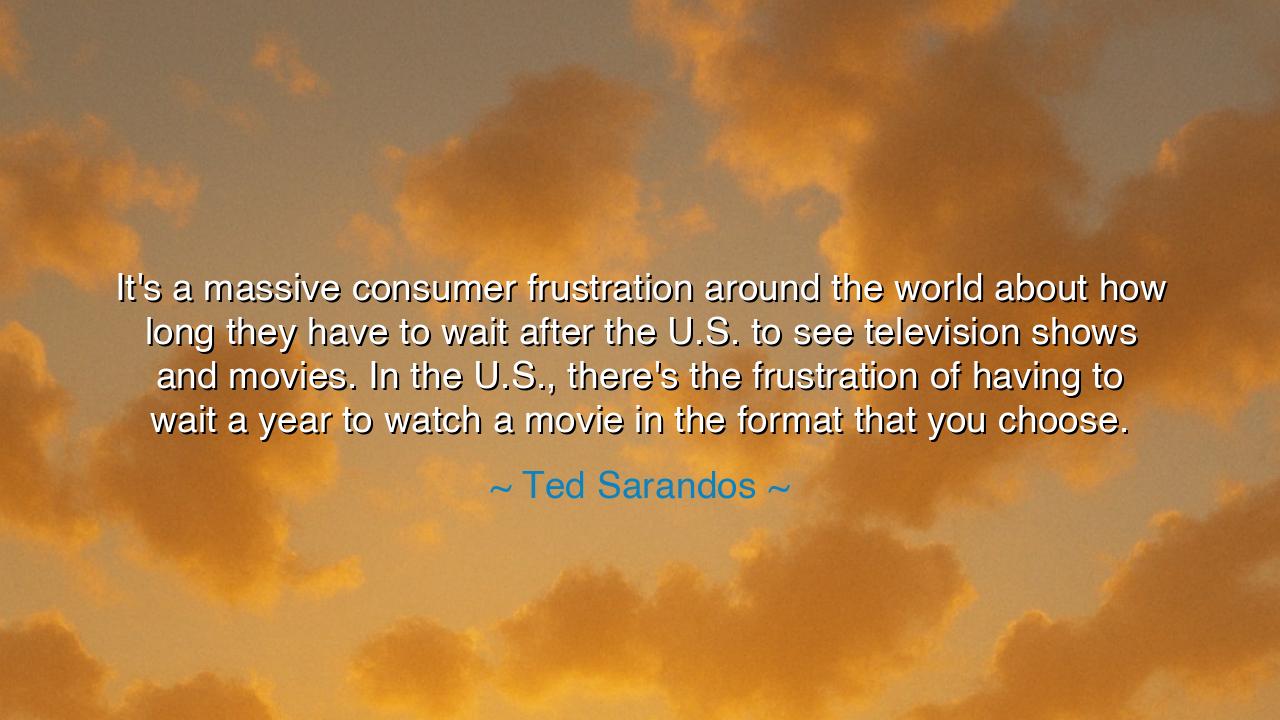
It's a massive consumer frustration around the world about how
It's a massive consumer frustration around the world about how long they have to wait after the U.S. to see television shows and movies. In the U.S., there's the frustration of having to wait a year to watch a movie in the format that you choose.






Ted Sarandos’ words, "It's a massive consumer frustration around the world about how long they have to wait after the U.S. to see television shows and movies. In the U.S., there's the frustration of having to wait a year to watch a movie in the format that you choose," reflect a deep-seated tension between the global demand for entertainment and the systems of distribution that have, until recently, dictated the timing and accessibility of content. Sarandos speaks to a modern dilemma that transcends national borders—where audiences around the world are frustrated by delays in access to films and television shows, and where those in the U.S. face their own frustrations of limited viewing options, delayed releases, and the overwhelming influence of traditional release schedules. His words touch on the fundamental human desire for immediacy, and the complexity that arises when technology and consumer expectations collide.
In the ancient world, stories were shared not through the flickering lights of modern screens but through the spoken word, the written page, and live performances. Homer’s epics, for instance, were passed down through oral tradition, with bards traveling from one place to another, recounting tales of heroism, gods, and fate. While there were no global audiences to deal with in the same sense we have today, there was still a longing for the spread of knowledge and entertainment. Just as the people of ancient Greece eagerly awaited the return of a traveling bard to hear the latest chapters of their favorite stories, we too are now consumed with the desire for instant access to the stories that shape our cultures and our understanding of the world. And yet, much like in those ancient times, there remains the challenge of access—how to share a story, how to unite the world in a shared experience, when distances, politics, and logistics separate us.
This desire for immediacy in storytelling has always been present in human history. Think of the Roman Empire, where news and stories from distant lands were carried by messengers, but those who lived at the empire’s edges often had to wait months or even years to hear what was happening in the heart of the empire. The Romans also faced delays in their access to information, though in their case, it was the spread of ideas and news, not movies or television. Their frustrations with waiting for news and entertainment echo those of modern audiences today. Sarandos’ quote highlights a fundamental truth of human nature—the frustration of waiting, and the desire for control over when and how we consume stories.
In the modern world, however, technology has radically shifted the landscape. Films and television shows are no longer bound by physical distance in the same way they once were. The advent of digital streaming, platforms like Netflix, and global distribution channels has brought about a shift in the way people consume entertainment. With just a few clicks, people can now access stories from around the world, breaking down the barriers that once separated them from global content. But the system of distribution still lags behind the technological advancements that have made instant access possible. Delayed releases and regional restrictions—fueled by complex deals and historical precedents—continue to create a disconnection between the audience’s desires and the industry’s capacity to deliver.
Think of the ancient trade routes, where spices, silks, and ideas moved across continents. The Silk Road, one of the world’s most famous ancient trade networks, connected the East and the West, allowing ideas, culture, and goods to flow freely, but it still took months or years for a single silk thread to travel from one empire to the next. Similarly, while the technological revolution has granted us the tools for instantaneous communication, the infrastructure and systems for global content delivery have not fully caught up. The frustration of the modern consumer is akin to the long wait for exotic goods or news in ancient times, but it is compounded by the fact that technology now makes instantaneous access possible. We live in an age where waiting feels more unnecessary than ever, yet the systems in place continue to lag behind our expectations.
The lesson that Sarandos’ reflection offers is one of balance and evolution. Entertainment has always been a tool for connection, for building shared experience across time and space. The modern world, with its instant communication and technological advancements, has the opportunity to offer a more unified global culture of stories—where every person, regardless of their location, can engage with the same narratives in real-time. The past, however, shows us that transmission—whether of goods, ideas, or stories—takes time, and delays are a natural part of the process. It is through continuous progress in distribution systems, and through understanding the inevitable growing pains of an evolving industry, that we can one day overcome the frustrations that still plague us.
In your own life, consider the balance between patience and immediacy. In a world that constantly demands faster responses, quicker access, and instant gratification, remember that delays and waiting are not necessarily hindrances but are part of the natural process of growth and change. While the frustration of waiting is understandable, it is in those moments of anticipation that we can grow in appreciation for what we are about to receive. Like the ancient traders who knew that the best goods took time to arrive, understand that the greatest rewards often come when we embrace the journey, not just the destination.






AAdministratorAdministrator
Welcome, honored guests. Please leave a comment, we will respond soon